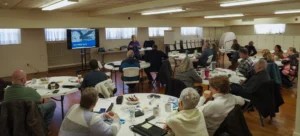Good Dads turned to two of its most skilled facilitators of the New Pathways program for our month-long coverage on the topic of managing challenging relationships. They gave advice for succeeding in one’s relationships in spite of the challenges that may come with them. Find Part I of this article, with Good Dads Facilitator Janice Reynolds, here.
Lee Bramlett is the Executive Director of Fatherhood Foundations: A Good Dads Chapter, and a father of four. He is a Master Facilitator for the Good Dads 2.0 course and has been teaching the program since it was published. Lee oversees more than dozen Good Dads classes in the KC area with the help of his staff and volunteers. Prior to his work with Good Dads, he and his wife were career missionaries as Bible translators in Cameroon.
Responses have been edited for length and clarity.
How do you define a challenging relationship?
Lee Bramlett: A challenging relationship is one where people can’t get along for the sake of something larger than themselves, like raising children together, for instance.
Many of the men I work with in the urban center of Kansas City tell me their greatest relationship challenges involve conflicting expectations. They tell me they feel they must compromise parts of themselves to satisfy the expectations of others. After making themselves small, they are nevertheless abandoned by their partners. This feeling of betrayal comes from circumstances much larger than a romantic relationship among two people. Larger cultural and structural forces like money, crime, social hierarchies—things outside of their control—all contribute to barriers men in the program face to maintain healthy relationships with those around them.
What are the hallmarks of challenging relationships? What things should be cause for concern, versus what is just a reality of life?
LB: Many men I work with struggle to understand their roles in their families and communities, and that’s a big challenge. They sometimes have very negative opinions of women because all their romantic experiences with women have been very poor. They say women aren’t in relationships for the long haul and that they care about money than they care about their partners, because these are their experiences. They’re frustrated.
Too much independence is another cause for concern. We live in a highly individualistic society that tells men and women alike that they must be strong, independent and make a lot of money. Inter-dependence could be a solution. Until both people in a relationship agree to be inter-dependent—that is, to truly need one another—you’re going to have a very fraught relationship.
There’s a lot of talk about toxic personalities, manipulators and other relationship buzzwords. These are serious allegations to accuse someone of. How might someone tell the difference between a truly dangerous relationship versus someone who is just difficult to be around?
LB: An important qualifier for a dangerous relationship is physical abuse. Also, you should ask yourself whose interests the other party is invested in. Are they looking out for your interests, their own, the interests of their children?
Last month on the blog, our theme was “breaking the pattern.” What role can healthy habits play in managing challenging relationships?
LB: Irrespective of religion, making a habit of meditation or daily devotion can be so helpful. Take time to be still and to reflect on the day. If you don’t make time for this, you start to live in chaos.

What advice do you give men when they’re dealing with a challenging relationship with another adult?
LB: Realize that you can only manage yourself. You cannot control others’ behaviors. Practice listening skills when faced with conflict. If others feel seen and heard by you, it can deepen understanding on both sides. In Good Dads classes, we practice the Speaker-Listener technique, where person A speaks, and the person B must summarize what the other said in their own words. It really slows a conversation down. This is particularly helpful for people who aren’t in the habit of truly listening, but are instead more interested in just trying to win an argument.
What about challenging relationships with children?
LB: There’s so much to be said for making an earnest attempt to be present in a child’s life. Find out what your kids need to feel safe. Get to know your kids and their preferences. Listen to your children. Take an interest in their interests. Use the communication styles that they like. My grandkids love Facetime, so I talk to them via Facetime. Consistently is important, too. If you only have five hours a week to spend with your kids, make sure those five hours happen every week. Time with your kids, even if they are in a bad mood, is still time well spent.
Men in New Pathways take the Within My Reach class as part of their program requirements. The course says people facing a disagreement or conflict often face one of these four communication danger signs: invalidation, withdrawal, escalation and negative interpretations. What advice do you have for men who want to resolve conflict with someone who uses these poor communication habits?
LB: Take time-outs when needed, but never give up. Persistence wins in the end. This is mostly relevant to fraught relationships between moms and dads, but in high-risk settings, you’ll often see mothers who are deeply hurt by the father’s actions and choices. She may feel abandoned, and as a result, may try to keep the children from him. By not giving up, you can prove doubters wrong. You can prove to your children that their father didn’t abandon them. This takes years, but it can soften a woman’s heart. Stay in the game and don’t give up.
What sorts of barriers are men most likely to face in managing challenging relationships, and how can they overcome them?
LB: There’s a lot to be said for financial stability, budgeting and honest work. Men in our program face tragedy after tragedy, and that’s not sustainable on part-time, hourly wages. We encourage asset buying to feed an entrepreneurial spirit, when previously folks may have turned to drug cartels to remedy their financial problems. This is not possible for everyone, but imagine putting aside 20% of your income to save up for a big investment. That will help you in the long run. Imagine how much better equipped you would be to manage challenging relationships if you weren’t fighting persistent poverty.
Giving back to the community and community service is another way to overcome barriers. Getting out to change lives, like building houses or helping others with general home maintenance can give a great feeling of encouragement.
Can you speak to the importance of a support system, or people you can turn to, in managing challenging relationships?
LB: You can never do it alone. Others always feed into us: If you have bad friends, you will lower yourself to that level. You may help them because you make them better—but they’re dragging you down, too! I read somewhere that you need four supporters for every one person dragging you down. I think this is so true. Some people are draining, so surround yourself by strong, authentic men, via a support group, men’s group, club, etc.





